We would like to welcome you to our Marie Sklodowska – Curie project “ENEFOR”. We proudly present you our website (http://enefor.eu) and we look forward for a live discussion on the project’s output!
Tagged / BU research
UK Nepali community research dissemination event
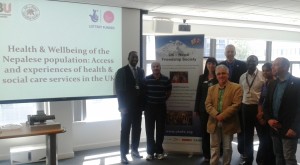
BU and UKNFS jointly presented some of the key findings of their study into the UK’s Nepali community. The meeting (22 July) in the EBC was attended by local representatives of the NHS, the CCG and Healthwatch Dorset. BU Prof. Vanora Hundley, Deputy Dean for Research (FHSS), who herself has published several academic paper on Nepal or English-language academic journals in Nepal, welcomed the audience. She highlighted how the research fitted into the wider health and soial care research portfolio of the Faculty.
BU Prof. Edwin van Teijlingen’s presentation highlighted the issues of access the health and social services in growing Nepali community in the UK. The reports highlights health and lifestyle issues, help-seeking behaviour and the influence of culture on health-related decision making. He mentioned barriers such as language and knowledge about services (or lack thereof). The findings of this study relate to previous studies in the field of ethnic minority communities int he UK. Mr. Alan Mercel-Sanca, Chairperson of the UK Nepal Friendship Society thanked the key researchers Dr. Bibha Simkhada (BU VIsiting Faculty) and Dr. Rajeeb Kumar Sah for conducting this mixed-methods research to such a high standard. He also thanked the Big Lottery Fund for making this ground-breaking piece of work possible, and the NHS England Equality and Health Inequalities team for their interest in final report and advice on the research.
The Report offers a unique opportunity for local health crae providers and commissioners to improve their understanding of this particular ethnic minority group. In the long run the report may lead to more effectively service delivery, especially in terms of health and social services that are sensitive to the needs of the Nepali community. Moreover, the report’s findings have direct relevance to other So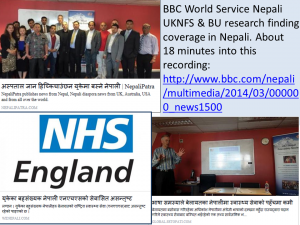 uth Asian and broader Black & Minority Ethnic (BME) communities in the UK.
uth Asian and broader Black & Minority Ethnic (BME) communities in the UK.
Finally, the audience heard how the report has been widely reported among the Nepali-language media to the Nepali community in the UK as well as in Nepal. This include coverage by the BBC World Service in Nepali, who interviewed Dr. Bibha Simkhada about the study.
The report is available online here!
Prof. Edwin van Teijlingen
CMMPH
Dragons’ Den a Roaring Success for BUCRU: ‘Now That’s What I Call Research!’
Last week the team from BUCRU hosted a Festival of Learning event to demonstrate their commitment to service user involvement in the research process. Using the BBC’s Dragons’ Den format, 4 local colleagues (Mr Bob Sangar, Dr Venky Dubey and Dr Neil Vaughan and Dr Steve Perring) showcased their research ideas to a panel of 5 dragons (who represented NHS service users) including Professor Ann Hemingway (HSS), Mark Mould (Chief Operating Officer, Poole Hospital NHS Foundation Trust) Peter Atkins (Carer and Service User Partnership, HSS), carer Eileen Hayward and service user Alan Lindsay. The event was expertly and humourously compered by Dave O’Loughlin from the HSS Mental Health Nursing team.
An audience of over 30 were entertained and informed about studying the best treatment for fractured ankles (Bob Sangar), a method for providing anaesthetists with the opportunity to practice siting obstetric epidurals (Venky Dubey and Neil Vaughan), and how the effect of cancer treatment on the central nervous system can be explored (Steve Perring). The afternoon was light hearted, fun and informative, with Peter Atkins kindly agreeing to be booted and plastered in the interests of science…
Audience participation resulted in Steve Perring’s project walking off with the dragons’ money, and Bob Sangar and Venky Dubey vowing to return next year for another bite of the cherry.
The Midwifery quilt online- URA scheme funded project
As part of my EdD thesis on ‘The essence of the art of a midwife..’ http://eprints.uwe.ac.uk/16560/ I created a reflexive textile quilt, with each of the squares representing an entry in my research diary. Whenever I have been to conferences with my quilt the question has always been asked ‘what do the squares mean’? Though I anticipate that anyone looking at it will gather their own interpretation of the squares my stories behind them are now accessible online. In the spring of this year I applied, and was pleased to receive, funding from the BU Undergraduate research assistantship scheme in order to create a web site for the quilt. For the past six weeks George Upson undergraduate student from the BA (Hons) Media Production course has been active in designing and creating the web site with me and learning about the world of academia in a small way. I am indebted to him for his creative abilities and to Garratt Lynch and Richard Wallis for their early support in the process, and also for the URA scheme!
The Midwifery quilt maybe accessed here http://www.midwiferyquilt.co.uk/
Dr Jenny Hall
Improving Nepali’s health & social care in the UK: Presentation of key findings 22 July at BU
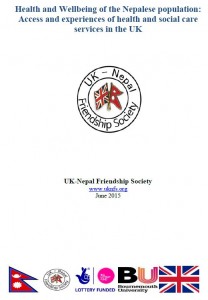
Bournemouth University presents some of the key findings of the first study of its kind of the Nepali community in the UK. The report also shows the way forward for improved UK Nepali community NHS and social care provision. The research is a joint initiative between the UK Nepal Friendship Society, Bournemouth University in collaboration with the South East London Nepali community and funded by the Big Lottery Fund.
Key findings from the report suggest in particular that the elderly Nepali population struggle to access cultural appropriate health and social care. This results in people accessing health services too late. Further research is needed on mental health, especially on loneliness and social isolation in the elderly, but also on minorities within the broader community as well as those with limited English language skills. Its recommendations have potential transformational value for the relationship between this ethnic minority, most well-known for its Gurkha community, and the NHS and social care providers.
Many Nepali people evidenced that they struggle with accessing and navigating NHS services, and that there are significant confidence-building requirements that need to be addressed concerning a revealed need for experiencing more equitable NHS customer service provision. The lead author Dr. Bibha Simkhada is Visiting Faculty at BU.
Ruth Passman of NHS England, Head of Equality & Health Inequalities commented:
“This report and its findings indicate the scale of the need for the NHS to have a better understanding of the needs of the Nepali community accessing in an effective and equitable way, and through its profile of health and wellbeing seeking behaviour of the community for the NHS to have the opportunity to better address in partnership with the Nepali community, its particular needs.”
Prof. Gail Thomas the Dean of the Faculty of Health & Social Sciences added: “Bournemouth University has a long-standing history of health and health promotion research in Nepal. This study amongst the Nepali community in South London reminds us of the importance of addressing health and well-being issues in ethnic minority communities in the UK.”
Mr. Tej Bahadur Chhetri, the Acting Ambassador and Charge D’Affaires at the Embassy of Nepal sent the following message:
This report is a most helpful contribution, to promote much needed change in healthcare provision for the Nepali community, especially with the fast approaching 200 years of special friendship and diplomatic relations between Nepal and the UK. The link between the two countries started with the Gurkha regiments becoming part of the British Army, and having been so to this day. The UK Nepali community will clearly benefit from the report and its recommendations’
Alan Mercel-Sanca, the Chairperson of the UK Nepal friendship Society added: “We particularly appreciate Dr Bibha Simkhada and Dr Rajeeb Kumar Sah’s dedication and high quality research in the Nepali community. We would also like to thank the Big Lottery Fund for making this ground-breaking piece of work possible, and the NHS England Equality and Health Inequalities team for their great interest in the value of the research. The Report offers a unique opportunity for our evolving NHS and the Ministry of Health to better understand and more effectively meet the needs and hear the Voice of the Nepali community – it clearly has direct relevance to other South Asian and broader Black & Minority Ethnic communities using and seeking to access an NHS that is equitable and effective.”
The presentation will take place tomorrow Wednesday 22nd July at 15.00 in the Executive Business Centre on Holdenhurst Rd. The meeting will be introduced and opened by Prof. Vanora Hundley, Deputy Dean for Research & Professional Practice in the Faculty of Health & Social Sciences. Prof. Hundley herself has published several academic paper on Nepal or English-language academic journals in Nepal.
Prof. Edwin van Teijlingen
CMMPH
@EvanTeijlingen
FoL event: What’s your story? Childbirth over the last 60 years.
Midwifery educators and researchers from CMMPH Dr Jen Leamon and Dr Jenny Hall, with help from Shelly Anne Stringer RDO, spent the day in an empty space engaging creatively with shoppers in the Sovereign Shopping centre in Boscombe. As part of BU Festival of Learning this is an ongoing project to consider the social history and contexts around people’s stories of birth. The childbirth process has in the last 60 years moved from being a private event shared by woman, their partner and the midwife to become a public one shared via many formats
of multimedia.
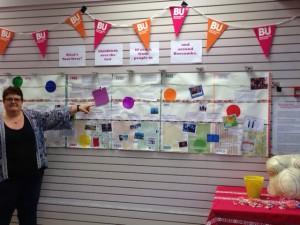 The day was spent encouraging members of the local community to contribute to a visual timeline of personal experiences of receiving or providing midwifery care, over the last sixty years.
The day was spent encouraging members of the local community to contribute to a visual timeline of personal experiences of receiving or providing midwifery care, over the last sixty years.
 The aim had been to engage local people in order to interrogate the local history of birth in the area. However on the day we gathered a wealth of stories from mothers, partners, grandparents and children with tales from the 1960’s to the present day but with a very international flavour!
The aim had been to engage local people in order to interrogate the local history of birth in the area. However on the day we gathered a wealth of stories from mothers, partners, grandparents and children with tales from the 1960’s to the present day but with a very international flavour!
We are very grateful to all those who sat and took the time to share their personal stories and were willing to add to the timeline. The stories were both moving and unexpected- that’s how research goes sometimes! More will develop on this project over time. We are also grateful to the team at the Sovereign centre who were so accommodating.
FoL event and an opportunity to get involved in co-creating conservation research
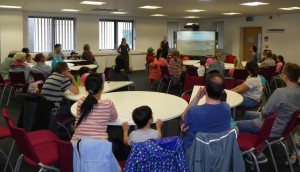
On Sunday Anita Diaz and Gitte Kragh joined with Michelle Brown and Darren Cook from the National Trust (NT) to run a joint BU-NT FoL workshop on the special species of Studland. We introduced our 70 guests to the amazing NT Cyril Diver project where Citizen Scientists and BU staff, BSc, MSc and PhD students have worked together to repeat a classic 1930’s survey of all the wildlife of Studland.
Our guests learnt how these surveys help conservation by helping us understand how species respond to environmental change over time. Then we invited our guest to participate in lots of face-to-face opportunities to meet up-close some of the wonderful wildlife!
Guests stroked snakes, stared spiders in their (8) eyes and squeezed spongy sphagnum mosses as they learnt about their ecology and how we can help conserve these and other wildlife.
If you would like to volunteer on the Cyril Diver project, or just find out more, then please contact Michelle on
Michelle.Brown1@nationaltrust.org.uk
No experience is needed as there are experts on hand and it’s a great way to learn and contribute to conservation while having fun!
Introducing Jo George, Undergraduate Research Assistant
Hello, I will be working within the Health and Social Sciences Faculty with Impact Champion, Zoe Sheppard, over the next six weeks on the endeavour to monitor and measure the impact of research.
My work will involve:
- Exploring methods of dissemination
- Conducting literature searches to investigate the demonstration of impact
- Working on two research case studies from the Health and Social Social Sciences Faculty
I can be found in R613 and contacted at jgeorge@bournemouth.ac.uk if you have any ideas or challenges you’d like to discuss. I will be sharing my findings towards the end of my six weeks here.
I look forward to meeting you,
Jo
Support and Celebrate our Research Success at the FoL – come along!
Support and Celebrate our Research Success at the FoL – come along!
We would love to see you at our Drop-in event ‘Research Reflections’ on the 16 July – feel free to attend for a session or two, or the whole day. Come along and hear about the huge range of Research taking place across the University, and support your fellow academics talking about their Research.
When: Taking place on Thursday the 16th of JULY in The Coyne Lecture Theatre in the Thomas Hardy Suite from 10am – 4pm.
Book now
Our confirmed speakers include:
10am Heather Hartwell, discussing the VeggiEAT project
10.40am Jamie Matthews discussing the international news coverage of the Japanese earthquake and consequent tsunami
10.55am Helen Farasat discussing her research with parents of children with eczema
11.10am Arjan Gosal – losing sight of trees for the honey
11.45am Angie Gosling
12.00 midday Sine McDougall on participating in Research
12.15pm Yeganeh Morakabati will speak about her experiences of teaching in Afghanistan
12:30pm Dan Weissmann, Anna Feigenbaum, Dan Jackson and Einar Thorsen exploring challenges that arise when working with data that is hidden, sensitive or obscured
12:45pm Elizabeth Rosser discussing her Marie Curie experiences
1.00pm Lunch
1.45pm Neil Vaughan, discussing his research into developing an epidural simulator
2.00pm Ashley Woodfall reflecting on the core conceptual struggle with a recently completed research project with children and those that make media for children
2.15pm Fabian Homberg will be observing and explaining petty corruption: An analysis of the “$20 sandwich trick”
3.00pm Carrie Hodges, Lee-Ann Fenge and Wendy Cutts speaking about their project which focuses on young people with disabilities.
3.15pm James Gavin will talk about his project looking at whether technology can be used to increase strength and balance in older adults
More speakers to be confirmed – please check our Blog posts for updates!
Don’t miss out – Webinar 8th July – H2020 IPR
 Attend our Webinar 8th July – Maximising the Impact of Horizon 2020 Projects – IP Rights
Attend our Webinar 8th July – Maximising the Impact of Horizon 2020 Projects – IP Rights
Maximising the Impact of Horizon 2020 Projects
Join RKEO staff at this free webinar presented by Dr Eugene Sweeney of the EU Intellectual Property Rights Helpdesk.
Taking place on Wednesday, 8th July in Room P403, from 9:30am to 10:45am
According to the website, in this 60 minute session, you will:
Learn more about exploitation of IP rights in H2020 projects. This webinar gives an overall view of the creation and the development of IP rights both through and after the duration of an H2020 project. The most common planning mistakes will be analysed and some practical tips will be given, so that you can have the best possible results from an H2020 project.
Learning Objectives
After the training, participants should have a better understanding of the following:
- The IP in the Consortium Agreements: a particular regard to the results of the research.
- Which are the best means to maximize the value of your IP?
- Assessing your IP: How can you estimate the value of your IP?
- Which criteria should be taken into account when it comes to determine how much your IP is worth?
- Which are the best exploitation strategies and business plans for entering the market?
- Reap the rewards of your IP: licensing and post deal managing.
As part of the webinar, there will be around 15 minutes after the presentation for Q&A. Depending on attendees, there may be the opportunity for BU-related discussions after the webinar.
To attend, please contact Dianne Goodman in RKEO ASAP to secure your place.
Paper published based on prestigious scholarship
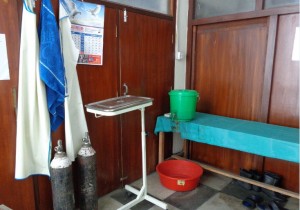
BU academics Ms. Lesley Milne, Prof. Vanora Hundley and Prof. Edwin van Teijlingen in collaboration with BU Visiting Faculty Prof. Padam Simkhada (Liverpool John Moores University) and Ms. Jillian Ireland (Community midwife NHS Poole) published there latest paper yesterday in BMC Pregnancy and Childbirth. The paper ‘Staff perspectives of barriers to women accessing birthing services in Nepal: a qualitative study’ originated from research conducted in small maternity hospitals in Nepal.
The project was funded in 2013 through the first ever WellBeing of Women-Royal College of Midwives International Fellowship Award. This Fellowship was the first of its kind. It was established to enable midwives to further develop research interests in midwifery, maternity services, pregnancy, childbirth and women’s health from an international perspective.
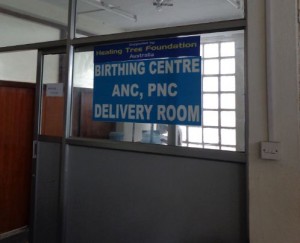
The Scholarship competition was open to RCM midwives undertaking research in the UK or abroad which would address Millennium Development Goals 4 (Reduce Child Mortality) and 5 (Improve Maternal Health). Lesley Milne in the Centre for Midwifery, Maternal & Perinatal Heealth (CMMPH) was the first and very worthy recipient of this award.
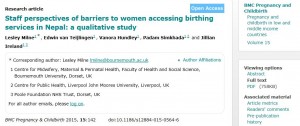
Based on the fieldwork we published our paper in BMC Pregnancy & Childbirth an Open Access journal. The paper highlights that Nepal has made significant progress with regard to reducing the maternal mortality ratio but a major challenge remains the under-utilisation of skilled birth attendants. We found other studies had explored women’s views of the barriers to facility birth; however the voices of staff who offer services have not been studied in detail. This research explored the views of staff as to the key reasons why pregnant women do not give birth in a maternity-care facility when they exist.
This study highlights a multitude of barriers, not all of the same importance or occuring at the same time in the pregnancy journey. It is clear that staff are aware of many of the barriers for women in reaching the facility to give birth, and these fit with previous literature of women’s views. However, staff had limited insight into barriers occuring within the facility itself and were more likely to suggest that this was a problem for other institutions and not theirs.
Edwin van Teijlingen, Lesley Milne & Vanora Hundley
CMMPH
@EvanTeijlingen / @VanoraHundley
Reference:
Lesley Milne, Edwin van Teijlingen, Vanora Hundley, Padam Simkhada and Jillian Ireland, Staff perspectives of barriers to women accessing birthing services in Nepal: a qualitative study, BMC Pregnancy & Childbirth 2015, 15:142 http://www.biomedcentral.com/1471-2393/15/142
‘Meet the Editors’ at BU Midwifery Education Conference
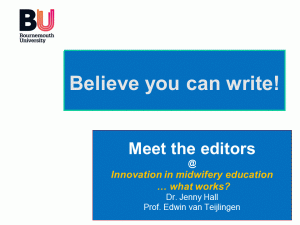 Dr. Jenny Hall and Prof. Edwin van Teijlingen are holding a lunchtime at today’s (Friday 3rd July 2015) BU Midwifery Education Conference (#MidEd15) in Business School. The one-hour session is advertised under the title ‘Believe you can write!’ Both BU academics are editors and on editorial boards of several prestigious health journals across the globe.
Dr. Jenny Hall and Prof. Edwin van Teijlingen are holding a lunchtime at today’s (Friday 3rd July 2015) BU Midwifery Education Conference (#MidEd15) in Business School. The one-hour session is advertised under the title ‘Believe you can write!’ Both BU academics are editors and on editorial boards of several prestigious health journals across the globe. 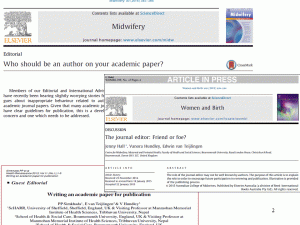
Over the past few years CMMPH staff have written and published several articles on academic writing and publishing. Some of these papers have been co-authored by BU Visiting Faculty, Dr. Bri jesh Sathian (Nepal), Dr. Emma Pitchforth (RAND, Cambridge), Ms. Jillian Ireland (NHS Poole) and/or Prof. Padam Simkhada (Liverpool John Moores University).
Prof. Edwin van Teijlingen & Dr. Jenny Hall
CMMPH
Twitter accounts: @HallMum5 / @EvanTeijlingen
Yesterday’s BRAD session – Public Engagement
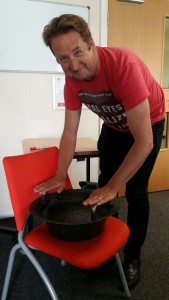 We had a very enjoyable and engaging BRAD session yesterday with Steve Dorney the Principal Public Engagement Fellow at the University of Southampton.
We had a very enjoyable and engaging BRAD session yesterday with Steve Dorney the Principal Public Engagement Fellow at the University of Southampton.
Here we have our Adrian Butterworth from the Faculty of Media and Communication demonstrating one of the many unusual items Steve brought in as an idea to possibly provoke, encourage engagement and participation with the public which did it’s job with us too – we became a little obsessed with making the bowl resonate causing a sound and the water to leap and dance.
As mentioned previously Steve Dorney is on Southampton’s Engaged University Steering Group and his activities extend to impact enhancement, student employability and outreach, as well as core support for Public Engagement with Research (PER) via a dedicated support unit www.soton.ac.uk/per .
He co-ordinates the Bringing Research to Life Roadshow www.soton.ac.uk/roadshow and through this has collaborated previously with BU on public engagement activities.
Steve led this workshop on how to make the most of public engagement, a key part of demonstrating the impact of your research and we covered:
- An overview of the PER agenda in the UK and internationallyExamples of effective PER from various disciplines
- Practical ‘top tips’ from Steve’s experiences in public engagement
- Why do public engagement – what’s in it for researchers?
- Strategies for presenting your research to public audiences
- How to build public engagement into your research planning
- Costing and funding public engagement activities
- Opportunities for collaboration
- Evaluating public engagement
- Public engagement, REF 2014, REF 2020 and Impact Case Studies
- Opportunities to get your public engagement noticed, i.e. awards etc.
Missed this session and would like to be notified when we possibly run it again please send an email to me dgoodman@bournemouth.ac.uk
Also it is not too late to book into one of our last 2 BRAD sessions being held on the Monday the 6th of July see below:
1st of July – Steve Dorney from the University of Southampton – BRAD Public Engagement Event at BU
Are you presenting at the Festival of Learning?

Add more to your Festival of Learning event by attending our BRAD event hosted by Dr Steve Dorney, Principal Public Engagement Fellow at the University of Southampton, who will be leading this workshop on how to make the most of public engagement, a key part of demonstrating the impact of your research. 
The session runs from 10am to 4pm on Wednesday the 1st of July – can’t attend all day, we urge you to book in and attend for as long as you can as this event won’t be repeated for a while.
Steve is on Southampton’s Engaged University Steering Group and his activities extend to impact enhancement, student employability and outreach, as well as core support for Public Engagement with Research (PER) via a dedicated support unit www.soton.ac.uk/per
He co-ordinates the Bringing Research to Life Roadshow www.soton.ac.uk/roadshow and through this has collaborated previously with BU on public engagement activities.
What to expect from this workshop:
- An overview of the PER agenda in the UK and internationally
- Examples of effective PER from various disciplines
- Practical ‘top tips’ from Steve’s experiences in public engagement
- Why do public engagement – what’s in it for researchers?
- Strategies for presenting your research to public audiences
- How to build public engagement into your research planning
- Costing and funding public engagement activities
- Opportunities for collaboration
- Evaluating public engagement
- Public engagement, REF 2014, REF 2020 and Impact Case Studies
- Opportunities to get your public engagement noticed, i.e. awards etc.
2 things you could bring to the workshop (completely optional but can be helpful):
– Any ideas for engagement projects related to your research that you would like to share/get some feedback on
– An object that is somehow related to your research
The workshop will allow time for you to consider your own research and will include refreshments and a networking lunch.
Book in now through Organisational Development: Public Engagement – Steve Dorney
Distinguished Social Science Public Lectures Series at BU

Presenting for the first time at this year’s Festival of Learning: the first two Distinguished Social Scientists Public Lectures at Bournemouth University. The inaugural lecture will be given by Professor John Holmwood on Monday 13th July at 18.00. John is Professor of Sociology at the University of Nottingham and founder of the Campaign for the Public University.

His lecture will centred on ‘The University, Democracy and the Public Interest.’ Following the election of 2010, the nature of the university was dramatically changed following the introduction of tuition fees and the removal of direct public funding from arts, humanities and social science subjects. This reduced public spending on higher education by 82%, shifting the costs on to students with increased revenues going into higher education. The lecture will suggest that the university has shifted from being at the service of democracy to being at the service of markets and their associated inequalities, such that it is now integral to a democratic deficit at the heart of wider public policy.
Tickets for John’s lecture can be booked at no cost here.
The second public lecture will be presented by Professor Judy Wajcman, Anthony Giddens, Professor of Sociology, at the London School of Economics on 16 July, 6-8.30 pm. Her lecture is based on her new book Pressed for Time: The Acceleration of Life in Digital Capitalism. 
More, better, faster. That’s modern life. And it’s all driven by the very devices that were supposed to make our lives better—our communication devices, which, rather than easing our work and social lives, instead impinge, leaving us no refuge from our responsibilities. But what if it’s not the devices that are to blame? What if we turn that around, and remind ourselves that they’re just tools—and that we can decide how to design and use them. It is only by bringing a social science lens to such issues that we can begin to understand how we have remade time and remade ourselves in digital culture.
Tickets for Judy’s lecture can be booked at no cost here.
The Distinguished Social Scientists Public Lecture Serie is facilitated by BU Professor Ann Brooks.
BRAD starts next week – don’t miss out – get yourself booked in!
Don’t miss out – BRAD week begins next week – there is still time to get yourself booked in to one of our BRAD sessions!
Taking place between Monday the 29th of June – Monday the 6th of July
Book into BRAD now – we have a rich variety of events including some new events waiting for you!
- Career Trajectory – Matt Bentley
- EndNote – Chris Wentzell
- Ethics and Research Governance – Eva Papadopoulou
- Financial Management – Gary Cowen
- Research Processes at BU – RKEO Officers and Facilitators
- Intro to the BU Clinical Research Unit – Peter Thomas
- NVivo
- Use of Surveys & Questionnaires in Research Projects – Colin Pritchard
We hope to see you soon!
BRAD Week – One week to go!!
 Just to advise you our next BRAD events programme is now LIVE.
Just to advise you our next BRAD events programme is now LIVE.
BRAD week is taking place from the 29th of June – 6th of July 2015.
Check out our events below and Book into BRAD now!
Please see the comments we received from people who attended our April BRAD events.
Introduction and Basics
- Career Trajectory
- EndNote
- Ethics and Research Governance
- Financial Management
- Research Processes at BU
We hope to see you at the events ……….soon
The Politics of Societal Impact: Community Development and Critical Scholarship
How can we do research that engages with communities in a genuinely collaborative way? What kind of research produces findings which address critical questions about the structural issues and problems faced by communities, but which are also of practical and transformative benefit to them? If these two objectives pull researchers in different directions, what kind of balance can be struck between them?
These are questions I have been pondering during two visits this semester to IUPUI (Indiana University Purdue University Indianapolis), in Indianapolis, USA. This is a university which places strong emphasis on the importance of community collaboration and engagement in scholarship and education. During two visits, I have particularly followed the community engaged work of Professor Susan Brin Hyatt.
I have known Professor Hyatt since June 2013, when she came to Bournemouth University to give a research seminar presentation about urban ethnographic research projects she and her students had undertaken in Indianapolis and Philadelphia (e.g., Hyatt et al 2012, Hyatt et al 2009. See also Hyatt 2001). During her visit we talked a lot about our common scholarly interests and discovered that we had a shared interest in the British Community Development Projects (CDPs) of the 1970s. The CDPs provide a very interesting example of the politics of using academic knowledge to bring about social change – or what we now call (societal) impact.

Meadow Well playground, 1976. Photography courtesy of Ken Grint. Available at IUPUI Digital Archive: http://indiamond6.ulib.iupui.edu/cdm/singleitem/collection/CDP/id/3685/rec/120
Initiated in 1969, the CDPs were a major social policy initiative, by the standards of then and now. There were twelve CDPs across the UK – mostly based in urban, industrial areas affected by economic decline, job loss and poverty. CDPs were set up with the aim of using community action to tackle various social problems associated with poverty and develop more integrated forms of service provision which responded to the local population’s needs. Each of the twelve CDPs incorporated a research team based in a university, and an action team based in the community, accountable to a local steering group. The idea was that social science knowledge and methods should both inform and support the development of local projects. The CDPs had an estimated budget of £5 million – a lot of money in those days. Most of the funding came from central government, but local CDPs operated with a high level of autonomy.
It is interesting to reflect on the CDPs from today’s vantage point. This was the creation of an ambitious infrastructure, across 12 regions, linking universities and academic researchers directly with community workers and activists in poor areas, with the explicit aim of enabling social science to inform social transformation. It is hard to imagine such a wide-ranging initiative emerging now, backed up by an equivalent budget from central government departments, in spite of widespread current concerns about growing use of food banks, zero hours contracts, high levels of in-work and child poverty and obscene income and housing inequalities; the kinds of problems which, some argue, are far more endemic now in the UK than they were in the 1970s.
Yet the CDP story is one in which two conflicting explanations of the causes of poverty unfolded (Loney 1983). The politicians and civil servants who set up the CDPs assumed a social pathology definition. They understood poverty to result essentially from the actions and beliefs of the poor themselves. From this viewpoint, what was needed was better, more joined up local services to help the poor to improve their skills and lifestyles, and become better adapted to the new economic realities of deindustrialisation. By contrast, those who worked for the CDPs quickly abandoned this definition of poverty in favour of a more structural perspective, attending to how social and economic policies reflected within corporate and government decision-making directly and indirectly gave rise to poverty and related social problems. In effect the CDP researchers, workers and activists refused to ‘localize’ the cause of the issues they tried to tackle. Their structural perspective informed how community action and research was used to engage, inform and mobilise local populations, and transform people’s lives for the better. This brought about many positive changes in areas in which CDPs were active and left some important legacies. However, this kind of impact was not what the government had in mind. CDPs were eventually wound down in the late 1970s, by which time politicians and senior government officials had mostly switched off from considering the implications of their findings for social policy at a wider level.
Although this was forty years ago, the CDPs have a strong contemporary resonance. Many of the problems tackled by the CDPs (poverty, insecure low paid work, unemployment) continue today, as do debates over how to deal with them. The activism and scholarship produced by the CDPs illustrates vividly how attempts to bring about positive change (to make an impact) in poor communities necessarily depends upon definitions of poverty which are always, inescapably political, whether or not they are recognised as such. As part of her research on British CDPs, Prof Hyatt and her colleagues at IUPUI have created a unique and extensive digital archive of many CDP reports, publications and photographs. This is an excellent resource for both teaching and research and I would like to recommend it to all colleagues interested in the issues discussed here.
References
Hyatt, SB., Linder, BJ., and Baurley, M. eds. 2012. The Neighborhood of Saturdays. Memories of a Multi-Ethnic Community on Indianapolis’ South Side. Indianapolis: Dog Ear Publishing.
Hyatt, SB., Branstrator, DW., Baurley, M., Dagon M., and Yarian, S. eds. 2009. Eastside Story. Portrait of a Neighborhood on the Suburban Frontier. Indianapolis: Department of Anthropology IUPUI, Neighborhood Alliance Press.
Hyatt, Susan B., 2001. From Citizen to Volunteer. Neoliberal Governance and the Erasure of Poverty. In Judith Goode and Jeff Maskovsky, eds. The New Poverty Studies. The Ethnography of Power, Politics and Impoverished People in the United States. New York: New York University Press.
Loney, Martin 1983. Community Against Government. The British Community Development Project 1968-78. London: Heinemann
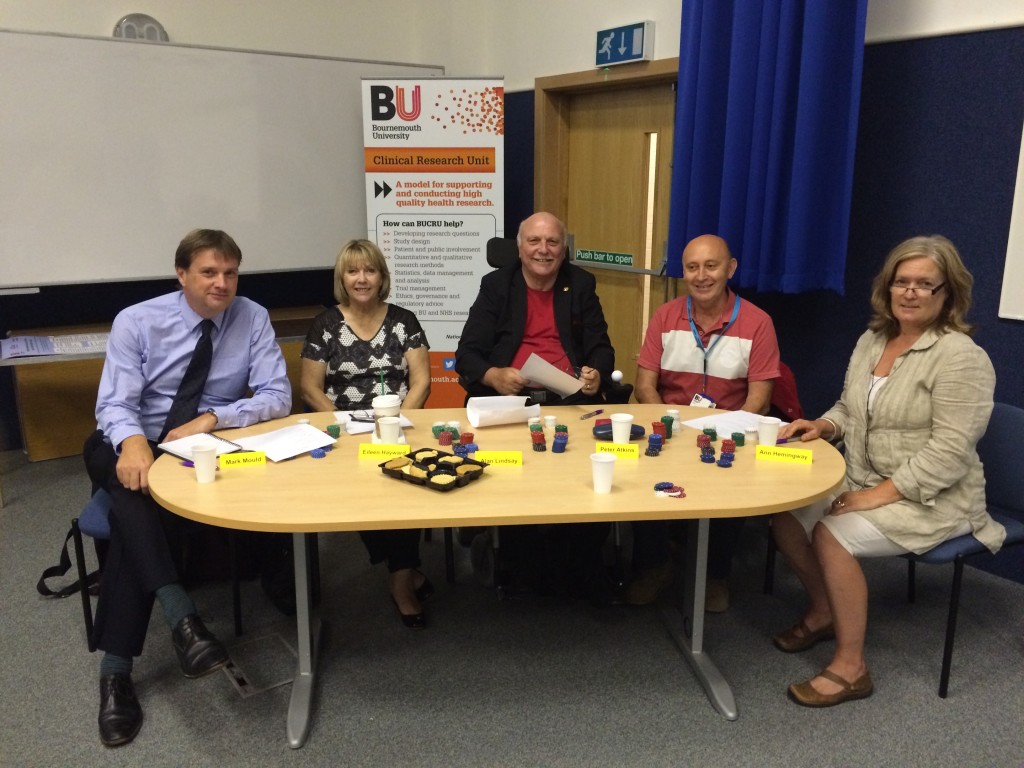

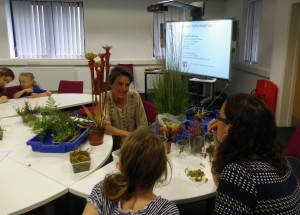
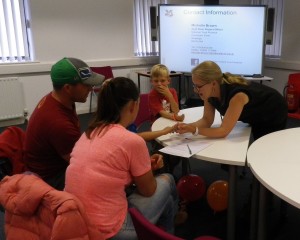
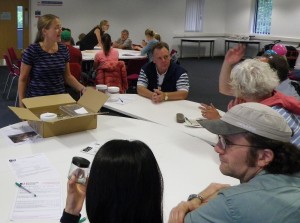












 Dr. Ashraf cited on ‘Modest Fashion’ in The Guardian
Dr. Ashraf cited on ‘Modest Fashion’ in The Guardian NIHR-funded research launches website
NIHR-funded research launches website Academics write for newspaper in Nepal
Academics write for newspaper in Nepal New paper published on disability in women & girls
New paper published on disability in women & girls Global Consortium for Public Health Research 2025
Global Consortium for Public Health Research 2025 MSCA Postdoctoral Fellowships 2025 Call
MSCA Postdoctoral Fellowships 2025 Call ERC Advanced Grant 2025 Webinar
ERC Advanced Grant 2025 Webinar Horizon Europe Work Programme 2025 Published
Horizon Europe Work Programme 2025 Published Horizon Europe 2025 Work Programme pre-Published
Horizon Europe 2025 Work Programme pre-Published Update on UKRO services
Update on UKRO services European research project exploring use of ‘virtual twins’ to better manage metabolic associated fatty liver disease
European research project exploring use of ‘virtual twins’ to better manage metabolic associated fatty liver disease